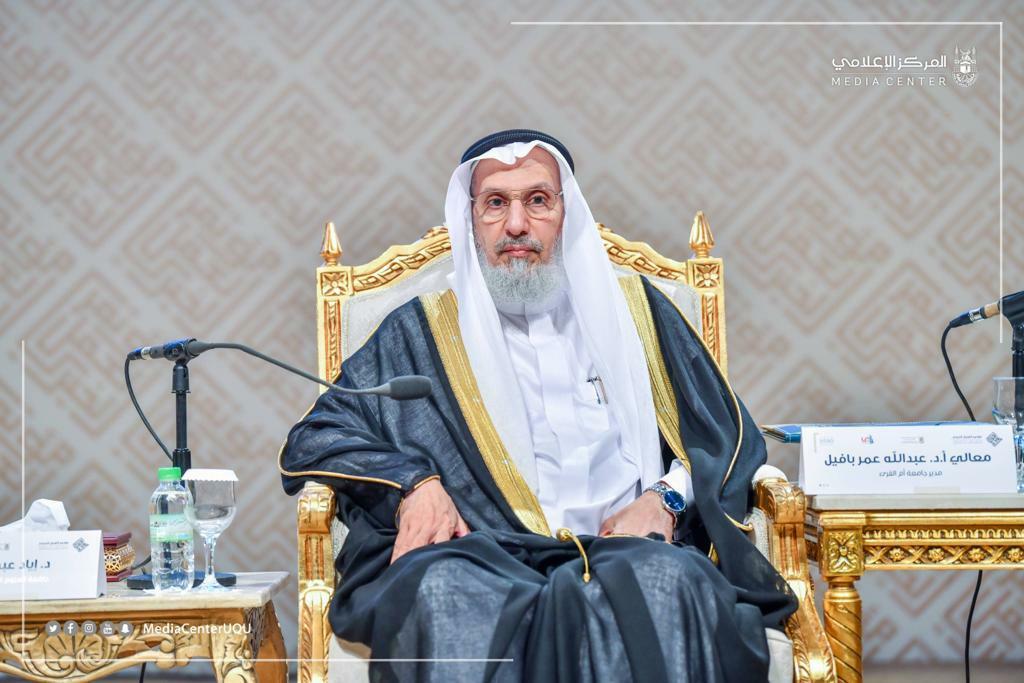
A specialized conference approved the UQU Document for Charitable Work after the agreement of a number of religious scholars and a number of experts in judiciary sciences and their Islamic legal bases on a package of principles and regulations that should be followed to organize the charitable work. This package aims to promote the role of charitable work and to achieve the main objectives of religion. It also contributes to building human communities according to scientific methodology that keeps pace with current realities and developments.
This document was one of the initiatives of the Charitable Work Conference that was organized by Umm Al-Qura University and represented by the College of Shari`ah and Islamic Studies, on 2 and 3 Safar, 1441 A.H., in partnership with Al-Huda Center for Shari`ah Studies for Charitable Activities, at King Abdulaziz Historical Hall, with wide-reaching participation on the international level.
The member of the organizing committee and the Head of the Shari`ah Department, Dr. Khalid Al-Jirisi, pointed out that the document is based on a number of legal principles and standing points. It concentrates on the necessity of encouraging scientific research to determine Islamic legal and referential visions relating to the work field of every institution and linking them to the objectives and collective principles of religion. It aims at forming the goals of the charitable institution according to the outcomes, necessities, and requirements of Islamic legal principles, and caring for Islamic legal sources, fundamentals, and principles relating to the goals of every institution and its executive programs, and taking them into consideration in theory and application, and in means and ends.
He indicated that the document aims at forming Islamic virtues and morals for partners, workers, and beneficiaries according to Islamic scientific methodology, activating value aspects through practical programs and projects, protecting charitable work, individuals, or institutions against the repercussions of moral and intellectual deviation, and achieving communal reform through the charitable sector in all fields of life according to a comprehensive Shari`ah vision.
Dr. Al-Jirisi stressed that the document has a significant role in controlling the practices and executive mechanisms of charitable work through legal rules and principles that achieve equilibrium, justice, transparency, and credibility. He added that the document pays great attention to the importance of keeping pace with current realities, looking ahead, studying new incidents relating to the charitable sector according to the objectives and main principles of religion and managing works according to them. The document also aimed at forming referential legal committees from which charitable institutions can seek decisions to achieve their objectives and control works and practices.
Consequently, participants in the International Charitable Work Conference at Umm Al-Qura University produced eight scientific recommendations in their final statement that was announced at King Abdualziz Historical Hall in Al-Abdiyyah under the title, "Objectives, Rules, and Implementations of Charitable Work," in the presence of his Excellency the President of the University, Prof. Abdullah bin Omar Bafail.
The Dean of the College of Shari`ah and Islamic Studies and the Secretary General of the Conference, Dr. Ra'id Al-Usaimi, expressed his thanks, on behalf of the participants, to the Custodian of the Two Holy Mosques, King Salman bin Abdul-Aziz Al Saud, and His Royal Highness the Crown Prince, Muhammad bin Salman bin Abdulaziz (may Allah protect them) for their noble agreement to organize the conference and facilitate it at Umm Al-Qura University represented by the College of Shari`ah and Islamic Studies. He also added that the conference is held under the noble patronage of His Royal Highness the Advisor of the Custodian of the Two Holy Mosques and the Emir of Makkah Province, Prince Khalid Al-Faisal.
Dr. Ra'id Al-Usaimi said, "Participants recommended circulating the example of the Kingdom of Saudi Arabia in charitable work through the mass media, publications, conferences, seminars, etc., which helps greatly in spreading and firmly establishing the culture of charitable work, and admitting some scientific parts relating to charitable work into the different stages of educational curricula. Stress should be placed on pointing out its concept, fields, and developmental role in different fields of life. Educational institutions should adopt practical applications of charitable work within their annual activities and plans.”
The recommendations called for constructing research centers, scientific chairs and expert offices to enrich charitable work with Islamic legal research, fundamental studies and cognitive needs required for building charitable work on scientific bases according to the objectives of Islamic law. They also called for forming Shari`i committees in every charitable institution that are able to determine community needs and how to answer to them. These committees also suggest the priorities of optimal investment in charitable work, offer suitable solutions for the problems and obstacles of charitable work, educate workers in legal issues, monitor the activities of the institution, and direct it according to legal rules and objectives.
The recommendations also called for issuing a scientific periodical journal for studying new incidents in charitable work under the supervision of the College of Shair`ah and Islamic Studies at Umm Al-Qura University, and launching initiative for forming (the scientific committee for charitable work) in partnership between the College of Shari`ah and Islamic Studies at Umm Al-Qura University and Al-Huda Center to study collective issues, new incidents, standards and regulations related to the activities of charitable organizations.
The recommendations included inviting academic bodies to study charitable works from all aspects through masters and PhD theses and scientific research, and charitable institutions to work according to the Umm Al-Qura document for charitable work issued by this conference to contribute to achieving the great objectives of religion according to scientific methodology that suits the requirements and developments of modern times. They also called for offering diplomas and training and educative courses for workers in the charitable sector and holding an annual conference at Umm Al-Qura University to study issues and new incidents in charitable work.